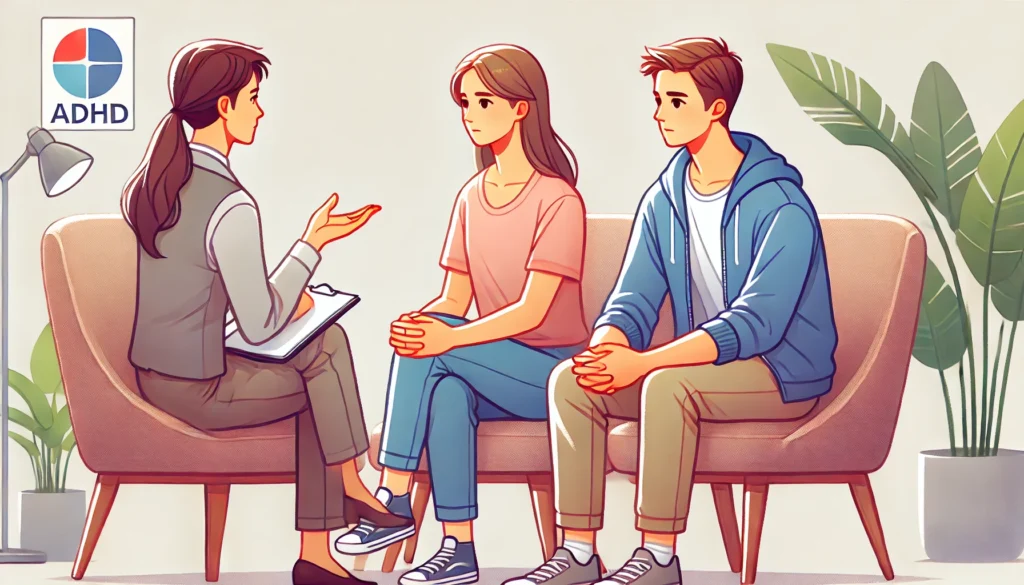The Dynamics of ADHD and Relationships
Attention Deficit Hyperactivity Disorder is a neurodevelopmental disorder characterized by symptoms such as inattention, impulsivity, and hyperactivity. These symptoms can manifest differently in adults, affecting their day-to-day interactions, especially in intimate relationships.
An ADHD partner may often struggle with forgetfulness, which can lead to situations like missed appointments or unmet commitments. It’s crucial to recognize that these lapses are not intentional but rather a part of the disorder’s complex nature. Understanding this can help in preventing misunderstandings and resentment.
Impulsivity in ADHD can result in spontaneous decisions that disrupt plans. While this spontaneity can be exciting, it can also cause friction if not managed well. Developing strategies to manage impulsivity can help in maintaining balance within the relationship, ensuring that both partners feel heard and respected.
You may also like: Enhancing Concentration: Strategies for ADHD
The Emotional Landscape for Non-ADHD Partners
Living with someone who has ADHD requires patience and empathy. Non-ADHD partners often find themselves shouldering more responsibilities, feeling like they are managing the relationship single-handedly.
They might experience frustration, resentment, or even guilt for feeling overwhelmed. These emotions can be challenging to navigate, especially without a clear understanding of ADHD’s impact. Acknowledging these feelings is the first step toward finding a healthy balance in the relationship.
Understanding these emotions is essential for maintaining balance and avoiding burnout. By openly discussing their feelings, non-ADHD partners can foster a more empathetic and supportive environment. It’s important for both partners to recognize the emotional demands ADHD places on a relationship and work together to address them.
Navigating Misunderstandings and Miscommunications
Misunderstandings are common in relationships where one partner has ADHD. The symptoms of ADHD can sometimes be misinterpreted as carelessness or a lack of interest, leading to unnecessary conflicts.
To navigate these potential pitfalls, it’s essential for both partners to communicate openly about how ADHD affects their interactions. This includes discussing specific behaviors that might be misunderstood and finding ways to address them constructively.
Moreover, establishing a framework for resolving misunderstandings can prevent minor issues from escalating into larger conflicts. By setting aside time to discuss misunderstandings calmly and constructively, couples can strengthen their bond and improve their communication skills.
Building Awareness and Empathy
Bridging the Gap with Communication
Effective communication is the cornerstone of any successful relationship, but it becomes even more vital when navigating the complexities of ADHD. Open dialogues about feelings, expectations, and boundaries can help bridge the gap between partners.
It is essential to approach these conversations with empathy, focusing on collaboration rather than blame. This involves listening actively and without judgment, ensuring that both partners feel heard and understood. By prioritizing empathy, couples can create a safe space for discussing the challenges posed by ADHD.
Regular check-ins can also be beneficial for maintaining open lines of communication. By setting aside time to discuss the relationship and any concerns, partners can stay connected and address issues before they escalate.
Educating Yourself and Your Partner
Knowledge is power. Educating yourself and your partner about ADHD can demystify the disorder and reduce stigma. Resources such as books, online forums, or therapy sessions can provide valuable insights into how ADHD affects behavior and relationships.
Understanding the science behind the disorder can foster empathy and equip both partners with tools to manage challenges effectively. By learning together, couples can develop a shared vocabulary and understanding of ADHD, which can enhance their communication and problem-solving skills.
Additionally, involving both partners in the learning process can create a sense of unity and shared purpose. By exploring ADHD-related resources together, couples can strengthen their bond and build a foundation of trust and mutual respect.
Developing Empathy Through Shared Experiences
Empathy is a crucial component of any relationship, especially when ADHD is involved. Shared experiences, such as attending support groups or workshops together, can enhance empathy and understanding.
By engaging in activities that promote empathy, couples can learn to appreciate each other’s perspectives and challenges. This can lead to a deeper emotional connection and a more resilient relationship.
Moreover, participating in shared experiences can provide opportunities for growth and learning. By stepping outside of their comfort zones and exploring new activities together, couples can build a stronger bond and create lasting memories.

Strategies for Strengthening Relationships
Embracing Structure and Routine
For individuals with ADHD, structure and routine can mitigate many of the disorder’s disruptive symptoms. Establishing clear daily routines and using organizational tools like calendars or reminders can help the ADHD partner stay on track.
Both partners should collaborate to create a balanced schedule that accommodates the needs of each individual. This might involve setting aside time for relaxation and spontaneity, as well as planning ahead for important tasks and commitments.
Consistency is key when it comes to routines. By sticking to a routine, couples can reduce stress and prevent misunderstandings, creating a more harmonious living environment.
Leveraging Support Networks
Building a support network is invaluable for couples dealing with ADHD. Support groups, whether in-person or online, can offer a safe space to share experiences and advice.
Couples therapy, especially with a therapist experienced in ADHD, can provide tailored strategies for overcoming relational hurdles. This professional guidance can help couples develop effective communication skills and coping strategies, strengthening their relationship.
Additionally, seeking support from friends and family can provide an extra layer of emotional support. By involving loved ones in the journey, couples can create a broader network of understanding and care.
Celebrating Strengths and Differences
Every individual, with or without ADHD, brings unique strengths to a relationship. Focusing on these strengths can shift the narrative from one of struggle to one of appreciation and growth.
Celebrate the creativity, energy, and spontaneity that often accompany ADHD, and find ways to channel these traits positively within the relationship. By recognizing and valuing each other’s strengths, couples can create a more balanced and fulfilling partnership.
Encouraging open discussions about strengths and differences can also promote a culture of appreciation. By acknowledging and celebrating what makes each partner unique, couples can foster a deeper emotional connection.
Building Resilience Through Challenges
Facing challenges together can strengthen a relationship. By viewing ADHD-related obstacles as opportunities for growth, couples can build resilience and adaptability.
Embracing a problem-solving mindset can also help couples navigate challenges more effectively. By working together to find solutions, partners can strengthen their bond and improve their communication skills.
Moreover, developing resilience can enhance a couple’s ability to handle future challenges. By building a strong foundation of trust and understanding, couples can face any obstacle with confidence and grace.

Looking to the Future: The Role of Awareness
Ongoing Education and Adaptation
ADHD is a lifelong condition, and as such, both partners must commit to ongoing education and adaptation. As new research emerges and as personal circumstances change, couples should be prepared to evolve their strategies and expectations.
Staying informed about advancements in ADHD research can also lead to new ways of managing the disorder effectively. By keeping up with the latest findings, couples can access new tools and strategies for navigating the challenges of ADHD.
Adapting to change is also crucial for maintaining a healthy relationship. By remaining flexible and open to new approaches, couples can continue to grow and evolve together.
Advocating for ADHD Awareness
Raising awareness about ADHD can benefit not only individual relationships but also the broader community. Advocating for better understanding and acceptance can reduce stigma and foster environments where individuals with ADHD feel supported and valued.
By sharing experiences and insights, couples can contribute to a more inclusive dialogue around ADHD. This advocacy can take many forms, from participating in community events to sharing personal stories on social media.
Engaging in advocacy can also strengthen a couple’s bond. By working together toward a common goal, partners can deepen their connection and create a sense of shared purpose.
Inspiring Change and Fostering Inclusivity
By advocating for ADHD awareness, couples can inspire change and promote inclusivity. Sharing personal stories and experiences can help others understand the challenges and strengths associated with ADHD.
Creating inclusive environments requires ongoing effort and commitment. By fostering understanding and acceptance, couples can contribute to a more supportive and empathetic community.
Moreover, promoting inclusivity can lead to positive societal change. By advocating for ADHD awareness, couples can help break down barriers and create a more accepting world for individuals with ADHD and their loved ones.

Conclusion
Building stronger bonds with ADHD awareness involves understanding the unique dynamics that ADHD introduces into relationships. Through empathy, education, and effective communication, couples can navigate the challenges and celebrate the strengths that ADHD brings to their partnership. By fostering an environment of support and appreciation, partners can build a resilient and fulfilling relationship that thrives despite the challenges of ADHD.
Remember, patience and understanding are key, and with the right strategies, living and loving with ADHD can lead to a deeply rewarding experience for both partners. By embracing the journey together, couples can cultivate a relationship filled with love, growth, and mutual respect.
Further Reading:
How Can ADHD Affect My Relationships?
How Does ADHD Affect Relationships?
Important Note: The information contained in this article is for general informational purposes only, and should not be construed as health or medical advice, nor is it intended to diagnose, prevent, treat, or cure any disease or health condition. Before embarking on any diet, fitness regimen, or program of nutritional supplementation, it is advisable to consult your healthcare professional in order to determine its safety and probable efficacy in terms of your individual state of health.
Regarding Nutritional Supplements Or Other Non-Prescription Health Products: If any nutritional supplements or other non-prescription health products are mentioned in the foregoing article, any claims or statements made about them have not been evaluated by the U.S. Food and Drug Administration, and such nutritional supplements or other health products are not intended to diagnose, treat, cure, or prevent any disease.


